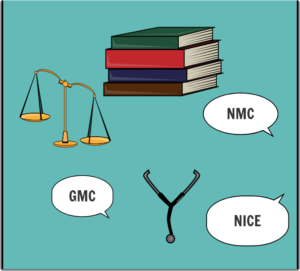Ethical, Clinical & Statutory Guidance Resources

The information and links to third party resources on this page are provided for training and education purposes only. Advice from a suitably qualified and experienced lawyer should be sought in relation to individual cases.
On this page you will find links UK government and other national bodies taking you to the following resources:
- Adults with Incapacity: Code of Practice for medical practitioners (Scotland);
- Child Death Review: statutory and operational guidance (England) (2018);
- Mental Capacity Act 2005 (MCA) Code of Practice;
- Mental Capacity Act 2005 (MCA) Code of Practice, Easy Read Version;
- Mental Health Act 1983 (MHA) Code of Practice;
- Mental Health Act 1983 (MHA) Code of Practice, Easy Read Version:
- National Institute for Health and Care Excellence (NICE);
- NHS Constitution of England (2012);
- Nolan Seven Principles of Public Life;
- Royal College of Paediatrics and Child Health ‘ Making decisions to limit treatment in life-limiting and life-threatening conditions in children: A framework for practice (2014);
- Scottish Intercollegiate Guidelines Network (SIGN);
Adults with Incapacity: Code of practice for medical practitioners
The Adults with Incapacity (Scotland) Act 2000 is an Act of the Scottish Parliament which applies in Scotland. It provides the legal framework for decision making for and with people aged 16 years and over who lack the capacity to make those decisions independently. The Code of practice for medical practitioners provides important statutory guidance as to how the provisions of the Act should be put into practice in the context of healthcare.
Child Death Review: statutory and operational guidance (England)
This guidance for all professionals working with children, sets out the processes which should be followed in England following the death of a child. The guidance was published in 2018, one of its aims was to improve the experience of bereaved families.
Mental Capacity Act 2005 Code of Practice
Mental Capacity Act 2005 Code of Practice (Easy Read Version)
The Mental Capacity Act 2005 is an Act of the UK Parliament which applies in England and Wales. It provides the legal framework for decision making for and with people aged 16 years and over who lack the capacity to make those decisions independently. The Code of Practice provides important statutory guidance as to how the provisions of the Act should be put into practice.
The Mental Health Act 1983 is an Act of the UK Parliament that applies in England and Wales. It provides the legal framework for the care and treatment of individuals with a mental impairment and the management of their property.
Mental Health Act 1983 : Code of Practice
Mental Health Act 1983: Code of Practice (Easy Read Version)
National Institute of Health and Care Excellence (NICE)
NICE ultimately gains its powers from the UK Parliament via the Department of Health in England. It is empowered to produce guidance covering four areas:
- clinical guidance on the appropriate treatment and care of individuals with specific diseases and conditions. Separate guidance is produced for adults and children (up to the age of 18 years);
- the use of health technologies within the NHS in England and Wales;
- guidance on health promotion for public sector workers;
- guidance for social care services and users.
Guidance is produced by committees of professionals, the voluntary sector and lay individuals, including patients and carers with expertise and experience in the relevant field. If you are interested in working with NICE, more information is available on their website.
NHS Constitution for England
The NHS Constitution sets out the rights, values and principles, patients, public and staff should expect when engaging with the NHS. AdsFoundation has produced a series of Learn with Dr Dog short films which explain the NHS Constitution.
Nolan Seven Principles of Public Life
‘The Seven Principles of Public Life (also known as the Nolan Principles) apply to anyone who works as a public office-holder. This includes all those who are elected or appointed to public office, nationally and locally, and all people appointed to work in the Civil Service, local government, the police, courts and probation services, non-departmental public bodies (NDPBs), and in the health, education, social and care services. All public office-holders are both servants of the public and stewards of public resources. The principles also apply to all those in other sectors delivering public services.’ (Source HM Gov.uk)
Royal College of Paediatrics and Child Health ‘ Making decisions to limit treatment in life-limiting and life-threatening conditions in children: A framework for practice.
Guidance published by the Royal College of Paediatrics and Child Health’s Law and Ethics Advisory committee on make end-of-life decisions for children.
Scottish Intercollegiate Guidelines Network (SIGN)
SIGN is part of Healthcare Improvement Scotland. SIGN develop and publish national clinical guidelines for best practice. SIGN involved professionals, the voluntary sector, patients and carers in their work. If you are interested in working with SIGN, more information is available on their website.
AdsFoundation welcomes suggestions you may have for further resources
AdsFoundation will be running a series of on-line workshops on healthcare law and ethics. Please CONTACT US if you would like to be sent more information about these.
We welcome your feedback on this and all our resources, including information of any additional resources we should include or any changes you think we should make to our existing resources. Please use the CONTACT US tab above to share your thoughts with us. Thank you
BACK TO End-of-Life and Post Death Resources
FORWARD TO Ethical Schools Resources



